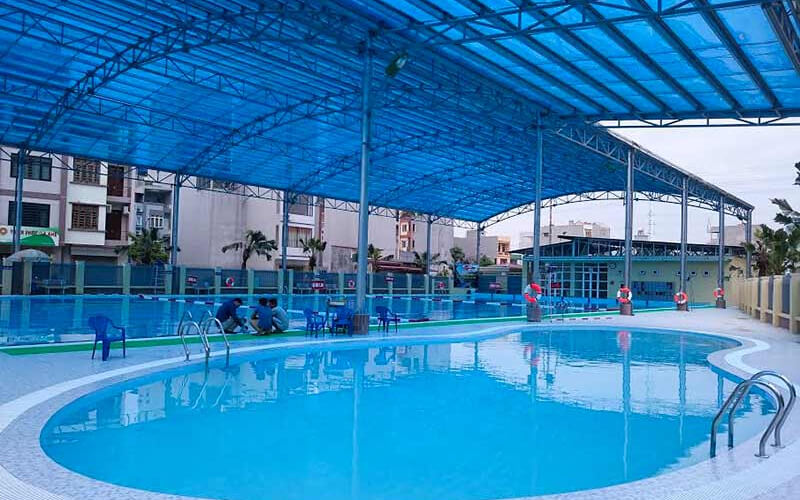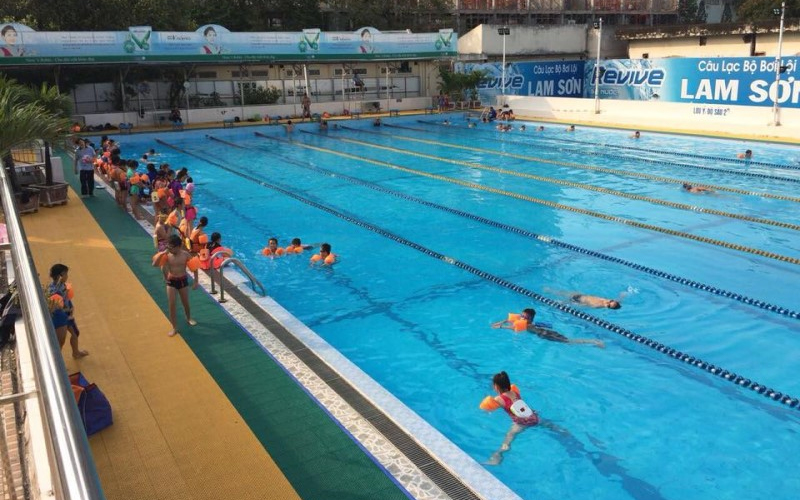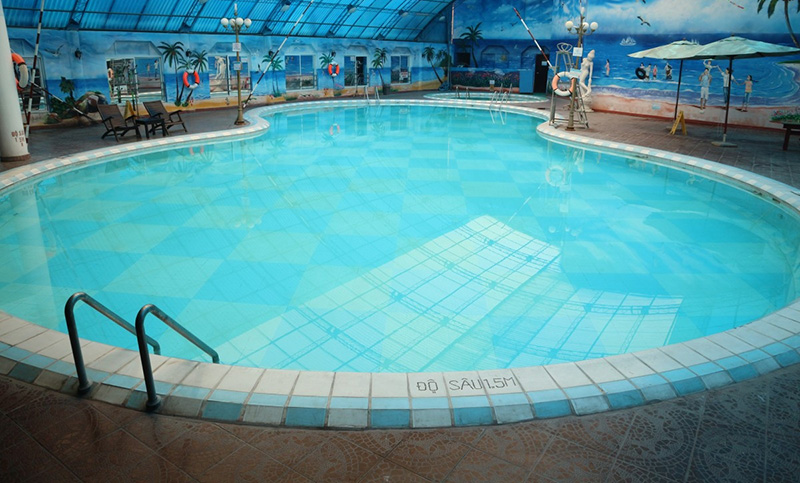Swimming is one of the healthiest and most beneficial sports for humans. If you are planning to start a business in this field, take a look at the information below.
1. Requirements for operating a swimming pool business
Staff Requirements
Staff members, who are responsible for providing guidance and instruction, must meet the following criteria:
- Staff should be instructors, coaches, or athletes of at least level II.
- Staff should hold a tertiary-level degree or higher in sports-related fields.
- Staff should possess professional certificates issued by international or national sports federations.
- Staff should have certificates of professional training issued by the provincial Department of Culture, Sports, and Tourism.
Lifeguard Requirements
Lifeguards must meet the following requirements:
- Lifeguards must be present whenever the swimming pool is in use.
- There should be one lifeguard for every 200 square meters of pool area and one lifeguard for every 50 swimmers.
- Lifeguards should hold professional certificates issued by authorized organizations or agencies.
Medical Staff Requirements
Medical staff at the swimming pool must have the necessary first-aid skills and professional qualifications as per regulations. Additionally, during the operating hours of the swimming pool, there must always be a medical staff member on duty.
 Requirements for operating a swimming pool business
Requirements for operating a swimming pool business
Facility Requirements
Swimming Pool Requirements:
- The swimming pool should have a minimum size of 8m x 18m.
- The pool bottom should have a uniform slope without abrupt changes, and the depth variation should not exceed 1m.
- The pool walls and bottom should be clean and free from cracks or broken tiles.
Diving Board Requirements:
- Diving boards should only be installed in pools with a minimum depth of 1.35m.
- For diving pools, the depth of the pool should be at least half the height from the water surface to the diving board.
Pool Deck Requirements: The deck should be flat, safe, non-slippery, and well-drained.
Footbath Requirements:
- The footbath should have a depth between 0.15m and 0.2m.
- It should be tiled with glazed tiles and maintain good water clarity and chlorine levels.
Water Quality Requirements: The water should meet the national technical regulations for drinking water quality, as stipulated in Circular No. 05/2009/BYT issued by the Minister of Health in 2009.
Additionally, the swimming pool facility should also meet requirements related to sound, lighting, medical room, hygiene, environment, etc.
Equipment Requirements
The swimming pool should be equipped with float ropes for swimmers:
- Horizontal float ropes: Used to divide the pool area into sections with a depth of up to 1m for non-swimmers and to separate it from areas with a depth of more than 1m.
- Vertical float ropes: Used in pools with a depth of 1.4m or more, designated for swimmers who already know how to swim.
In terms of rescue equipment, the swimming pool should have the following:
- Rescue poles: At least 6 poles with a length of 2.5m each, painted in red and white, should be available at each pool.
- Life buoys: A minimum of 6 life buoys should be provided for each pool.
- Rescue chairs: The height of the chair should be at least 1.5m above the pool surface.
2. Steps to obtain a swimming pool business license
Step 1: First, the business owner needs to determine where to apply for the swimming pool business license, and obtain either the certificate of ownership of the swimming pool or a lease agreement with verification from the People’s Committee of the commune, ward, or town, or a state-authorized notary public.
Step 2: The business owner should choose a unique name for the swimming pool business. The name should not be identical to any existing business names. Additionally, the owner needs to select an appropriate business type, such as a private enterprise, joint-stock company, limited liability company (either single-member or multiple-member), etc.
Step 3: The business owner should prepare the necessary documents to apply for the swimming pool business license. The required documents may vary depending on the chosen business type and typically include:
- Application for business registration
- Copy of the ID card or passport of the legal representative of the swimming pool business
- Company charter
- Power of attorney and ID card of the person submitting the application
Step 4: The business owner should submit the application and required documents to the District or Provincial Department of Planning and Investment and pay the corresponding fees and charges as stipulated by the state. Additionally, the owner should also register and publish the enterprise information on the National Business Registration Portal.
Step 5: The business owner receives the business license.
Step 6: The business owner should proceed to make a company seal and register the seal sample with the relevant authorities.
Step 7: The business owner completes the procedures for registering a bank account and initial tax registration.
Step 8: The business owner pays the business license tax through the electronic tax portal of the Tax Department.
 Steps to obtain a swimming pool business license
Steps to obtain a swimming pool business license
3. Procedure for obtaining a swimming pool business permit
 Procedure for obtaining a swimming pool business permit
Procedure for obtaining a swimming pool business permit
Step 1: Prepare the necessary documents for obtaining a swimming pool business permit, including:
- Application for a business permit for swimming and diving activities
- Summary of the prepared business conditions
- Staff profiles of trained lifeguards, including ID cards, household registration books, qualifications, and employment contracts
- Medical staff profiles at the swimming pool, including ID cards, household registration books, qualifications, and employment contracts
- Business location documents, including land-use rights certificates or lease agreements
- Water quality test results
- Confirmation from the local authorities
- Commitment to ensure public order and security
- Insurance for entertainment services
- Color photos of the entire swimming pool area and fire-fighting equipment
Step 2: Submit the application and required documents to the one-door division of the local Department of Culture, Sports, and Tourism.
Step 3: Receive the swimming pool business permit. If the application is valid, the business owner will be granted the permit within 5 working days.
The above information outlines the procedures, conditions, and requirements for obtaining a swimming pool business license. We hope this article has provided you with helpful insights.
The fastest and most accurate guide to look up online business licenses that not everyone knows
Verifying and checking business licenses is a crucial step in ensuring the accuracy and legitimacy of business information. This can be done through the National Information Portal or the Tax Department’s website. By searching for business licenses, businesses can ensure their compliance with regulations and establish a solid foundation for growth.


































